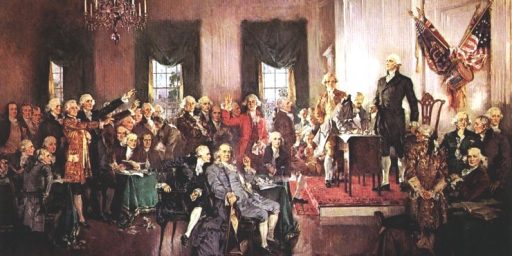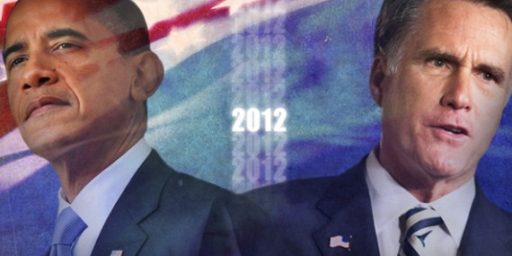War Declarations
Mario Cuomo argues that the Webb-Clinton proposal to demand President Bush get a congressional declaration of war before taking military action against Iran is redundant because Article I, Section 8 of the Constitution already requires this. Further, “Because the Constitution cannot be amended by persistent evasion, this mandate was neither erased nor modified by the actions or inactions of timid Congresses that allowed overeager presidents to start wars in Vietnam and elsewhere without making a declaration.”
Congress’s refusal to comply with Article I, Section 8 of the Constitution has led to a catastrophic aftermath. Such a tragedy should never be allowed to happen again. Rather than enact new legislation that would create constitutional ambiguity, the Democratic leadership in Congress should assert its strength by simply announcing it will allow no “resolutions” or “authorizations” purporting to delegate to the president Congress’s constitutional power to declare war against any other nation. Nor will there be any new war without Congress’s solemn deliberation and declaration of war.
The Democrats should go still further and announce that no money will be appropriated for any military action against another nation without a proper declaration of war. And this should be the position of the Democratic presidential candidates as well. How else can they make the case that they are less likely than President Bush to wage dangerous, improvident wars?
The Supreme Court has long since rejected Cuomo’s interpretation of the Constitution; indeed, Congress itself did so formally with the 1973 War Powers Act. FindLaw does an excellent job summarizing the relevant case law.
In the early draft of the Constitution presented to the Convention by its Committee of Detail, Congress was empowered ”to make war.”1412 Although there were solitary suggestions that the power should better be vested in the President alone,1413 in the Senate alone,1414 or in the President and the Senate,1415 the sentiment of the Convention, as best we can determine from the limited notes of the proceedings, was that the potentially momentous consequences of initiating armed hostilities should be called up only by the concurrence of the President and both Houses of Congress.1416 In contrast to the English system, the Framers did not want the wealth and blood of the Nation committed by the decision of a single individual;1417 in contrast to the Articles of Confederation, they did not wish to forego entirely the advantages of executive efficiency nor to entrust the matter solely to a branch so close to popular passions.1418
The result of these conflicting considerations was that the Convention amended the clause so as to give Congress the power to ”declare war.”1419 Although this change could be read to give Congress the mere formal function of recognizing a state of hostilities, in the context of the Convention proceedings it appears more likely the change was intended to insure that the President was empowered to repel sudden attacks1420 without awaiting congressional action and to make clear that the conduct of war was vested exclusively in the President.1421
An early controversy revolved about the issue of the President’s powers and the necessity of congressional action when hostilities are initiated against us rather than the Nation instituting armed conflict. The Bey of Tripoli, in the course of attempting to extort payment for not molesting United States shipping, declared war upon the United States, and a debate began whether Congress had to enact a formal declaration of war to create a legal status of war. President Jefferson sent a squadron of frigates to the Mediterranean to protect our ships but limited its mission to defense in the narrowest sense of the term. Attacked by a Tripolitan cruiser, one of the frigates subdued it, disarmed it, and, pursuant to instructions, released it. Jefferson in a message to Congress announced his actions as in compliance with constitutional limitations on his authority in the absence of a declaration of war.1422 Hamilton espoused a different interpretation, contending that the Constitution vested in Congress the power to initiate war but that when another nation made war upon the United States we were already in a state of war and no declaration by Congress was needed.1423 Congress thereafter enacted a statute authorizing the President to instruct the commanders of armed vessels of the United States to seize all vessels and goods of the Bey of Tripoli ”and also to cause to be done all such other acts of precaution or hostility as the state of war will justify . . .”1424 But no formal declaration of war was passed, Congress apparently accepting Hamilton’s view.1425
Much more at the link, with the footnotes themselves linking to relevant cases. The bottom line, though, is that presidents have, since Thomas Jefferson’s day, claimed the inherent right as the nation’s chief executive to conduct war and the courts and Congress have allowed them to do so.
Further, the two longest wars conducted without formal “declaration of war” by Congress, Vietnam and the current Iraq War, were both pursuant to acts of Congress authorizing the use of force. Most scholars see those as having the same effect as a declaration; indeed, the distinction may well be meaningless.
Cuomo is on much firmer ground with the public policy question of whether it would be a good idea for Congressional deliberation and authorization to precede going to war. Presuming that the nation isn’t under direct attack or facing imminent action, thus requiring more speedy response than a legislature can provide, it would seem obvious that the answer is Yes.
Presidents command the national security apparatus of the country and have access to the collective wisdom of our diplomats, military professionals, and intelligence community in a way Congress doesn’t. But executive decision-making process tends to come down to one man getting advice from a handful of others. Groupthink and the vagaries of bureaucratic information filtering can skew the process tremendously. If nothing else, Congress at least slows down the process and brings in a wider set of perspectives.
Practically speaking, as Theodore Roosevelt taught us, Congress’ ability to simply not fund ongoing military operations is far more theoretical than real. There’s a natural rally effect once the country is at war and troops are in harm’s way and the public simply demands that the legislature get on board. Only after a protracted engagement does this change.
Ultimately, the solution to the problem of going to war willy-nilly to achieve non-emergency goals is a radical shift in the national consensus. It appeared that we’d achieved that after the myriad optional wars of the 1990s when a fellow by the name of George W. Bush ran on a platform of “no nation building.” Alas, we all know what happened next.






Hamilton’s view may be a direct result of what would have been the dominant political philosophy of their time from John Locke’s 2nd Treatise of Civil Government. There he describes how a “State of War” is entered. If attacked, the natural, rational rules of relationship cease to apply, and one is in a State of War, Locke said.
Congress would have seen no need to declare war when attacked, as Locke’s theory would have been well known. Locke had already declared war for them, in essence.
Ergo, Iran, through its agents has defacto declared war on the United States.
I continue to think as I have thought for the last five years: that too much attention is being paid to the executive and not nearly enough to the Senate. Every single Senator who had any prospect whatever of running for the Presidency in 2004 (or 2008) voted for the AUMF.
I can’t entirely fault them. This is what Senators do. But to turn around and proffer lame excuses for the vote is despicable.
There was also no declaration of war in 1861. The bloodiest war the US ever fought was done so with no declaration. Lincoln insisted that the president had trhe inherent authority to suppress rebellion.
After the Oct. 2002 resolution authorizing force against Iraq, Joe Biden said explicitly that the resolution met the Consitutional definition of a declaration. As he pointed out, the Const. gives the Congress the authority to declare, but does not define what a declaration is. The Congress, said Biden, decides for itself what a declaration consists of. And he said that every member of Congress understood that the resolution was in fact a declaration.
I posted this with links at the time, but permalinks on my site are dead right now since my hosting company is not terribly competent.
While I certainly think those votes were naive and short sighted it is also true that in 2002 Bush had not yet revealed the depth of his passion for the “unitary executive” and warmongering in general. Those same senators can and have made arguments that the AUMF was meant as a bargaining chip an example that the US was resolved with regards to Iraq.
We can castigate them for being starry eyed in the matter but the vast majority of blame lies with the executive, who after all had no intention of bargaining at all but only wanted the capacity to go to war regardless of how many lies had to be told or laws broken.
Or, said another way, you’re arguing that those senators just fell off the turnip truck and are too naive to hold office.
I just don’t see it that way. I think they knew exactly what they were voting for it and have tried to explain it away now that it’s become inconvenient.
Good point, Dave! And the truth.
Libs have to love James’ liberal rant: “the problem of going to war willy-nilly to achieve non-emergency goals is a radical shift in the national consensus.” How is it that liberals feel the problem of radical Islamic terrorism is just simply going to go away on its own? What sort of attack on America will convince them that the threat is real: nuclear? Probably. Heck, even then you wonder.
Spock-er, I mean, Tlaloc: don’t go gettin into a hissy now. The liberal line “in 2002 Bush had not yet revealed the depth of his passion for the “unitary executive” and warmongering in general”, as all of you liberals know, is fake. You’re only TRYING to tag it on Bush for the lesser witted out there. But YOU don’t have to get upset. It’s all ok, really. Keep muttering to yourself, “Hillary. Clinton. Hillary. Clinton. Hillary…”
don’t be foolish, Dave. A credible threat is a common negotiation ploy. The reason such an action is so foolish is because of the character of the man doing the negotiating, but as I said that character hadn’t been revealed at the time.
Same way that the christian fundamentalist problem “went away” (it didn’t go away entirely but it was dramtically reduced in scope): through moderating social forces. Western Europe had the enlightenment to help wash away the worst dregs of christianity. The middle east can go through a similar change.
The key then is for us to promote such a change in consciousness. That requires a degree of understanding of human psychology that you don;t seem to possess.
No, actually it’s pretty true.
Like I said before you seem to lack an understanding of human psychology. That’s why you keep making mistakes like assuming I’m upset as well as assuming I support Hillary Clinton for President.
Mostly, I’m speaking of military interventions such as dominated the Clinton years: optional wars having no relation to our national security interests. An invasion of Iran launched without the approval of Congress would qualify as well.
It’s hard to argue that nation building in Iraq has done much to combat radical Islamic terrorism. It’s even harder, though, to argue that we went in willy-nilly without Congressional approval, since we spent half a year or more debating the war and got Congressional approval.
Tlaloc, a threat isn’t credible unless you’re actually willing to use it. Diplomacy and negotiations had been pursued for over a decade, and for over a year and a half under the Bush Administration before passage of the AUMF.
The cries of “Bush lied to us” or “Bush hid his evil nature” or “by authorizing the use of military force, we were really only authorizing people to issue threats without actually using military force” are easily discerned as the lies that they are.
Tlaloc, I don’t recall the Senate ever explicitly authorizing the executive to use military as a negotiating ploy. Do you have examples?
This is an item on which I have substantial disagreement with the Bush Administration. I don’t believe that the U. S. should engage in threats. Its overwhelming military power is already a threat. In that context verbal saber-rattling is counter-productive, suggesting a lack of willingness to use force and inviting aggression.
Don’t get me wrong, Tlaloc. I thought invading Iraq was ill-conceived. But I think that voting for the AUMF with visions of the Oval Office dancing in your head, then back-pedalling for the same reason is wicked.
Obviously.
You left out a part- diplomacy had been tried AND HAD BEEN WORKING. That’s kind of relevant. The only reason teh AUMF was brought up was because the administration consistently lied about the intelligence leading to a perception that diplomatic efforts had not worked, hence leading to a perception that more forceful negotiation (i.e. backed up with credible threats) was called for.
*shrug*
you can believe what you want, just as I can. I guess the question is which of our views the electorate will cleave to more closely.
Dave do you usually announce in Poker “I’ve given myself authority to cluff!” Of course they never explicitly said “the UMF is merely a tactic to give the appearance of a credible threat” because then it wouldn’t be a credible threat.
Or maybe they never meant that. But they’ve said they did, and the argument makes a fair amount of sense.
It’s a powerful military but also hampered by a democratic control system, such systems are not very effective at war. I have no problem with the judicious use of threats. It can prevent worse after all. That said I think it’s a tactic to be used sparingly. Trade is a lot more effective and beneficial than maintaining a lot of troops always on alert.
I’m not going to put it down as their finest moment by any means. But under the circumstances I can see a colorable argument for doing it. I certainly respect more those with the foresight to vote against (23 senators and 133 reps).
blech. “bluff” not “cluff”
Bob Graham ought to have put this hoary old lie out of its misery a long time ago [Portion of comment in violation of site policies deleted.]
The executive was misrepresenting the intelligence to the vast majority of Congress. You can, as I do, blame the few members of Congress who had better access (like Graham) for not doing more, but this does not in any way, shape, or form excuse the executive.
This does not hold up as an analogue to Korea, Vietnam, or Iraq because of a fact present in your own description – Lincoln was suppressing rebellion. A declaration of war was actively ruled out by Lincoln and his advisors because to do so would have been a de facto recognition of the sovereignty of the Confederacy, an act that would have undermined the very struggle Lincoln was undertaking to resolve.
This is true. What is also true is that we went in on the basis of dubious, exaggerated, or fabricated evidence, and that the Congressional mandate was only explicitly for removal of the regime, not a prolonged regional occupation. Congress has at least some footing to claim that the current action exceeds the scope of the authority granted by AUMF, though this is undoubtedly a political question that will never practically be resolved through the courts (who will refuse to take it).
The reality is as James says; until and unless the political will exists to defund the war, there is not much that Congress could do, though it would be on equally solid Constitutional footing if it were to rescind AUMF completely.